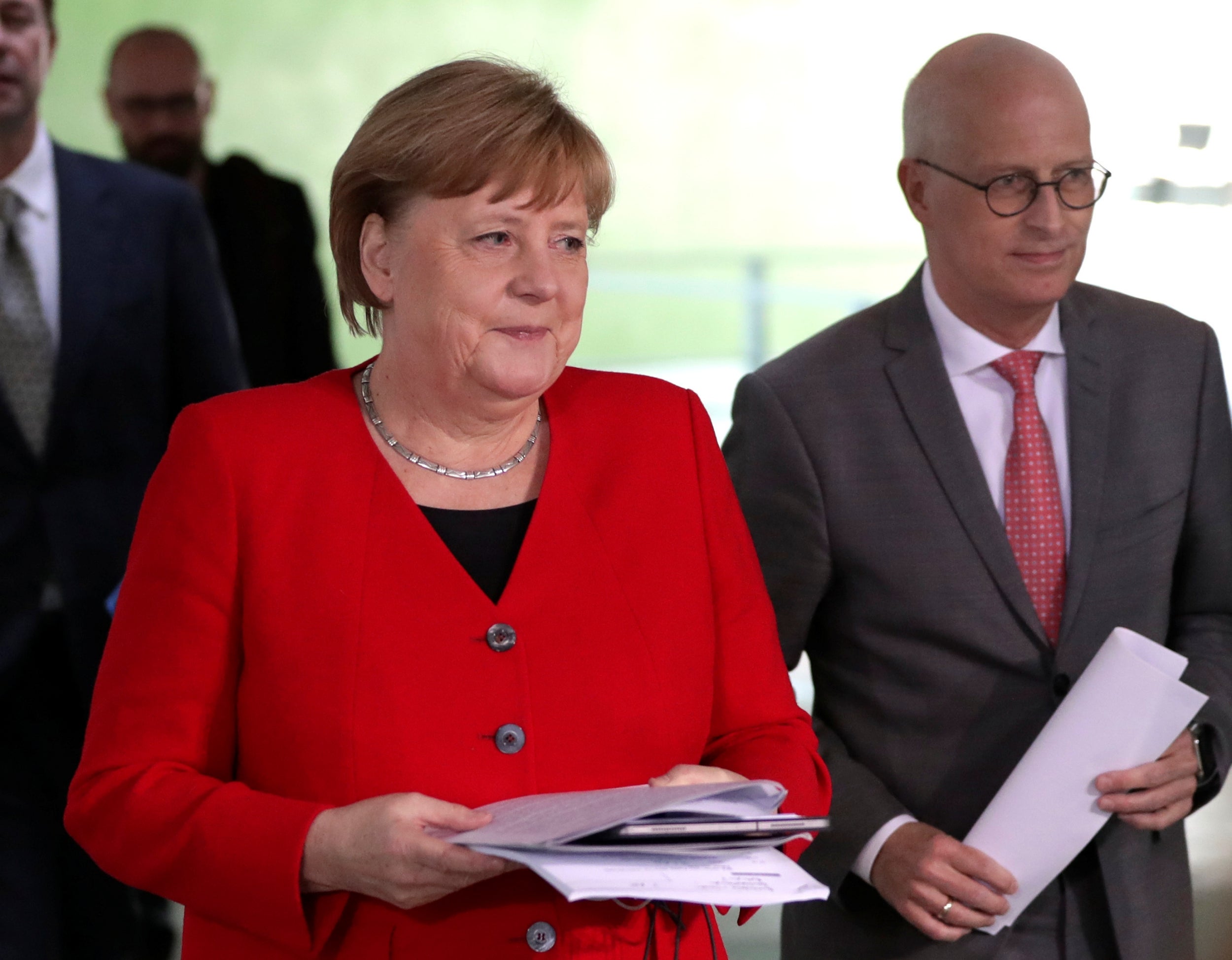How coronavirus has restored faith in experts and Merkel’s establishment in Germany – and hurt the far right
Polling numbers for far-right AfD party have plummeted, while a daily podcast with a leading government virologist has become essential listening. Jessica Bateman reports from Berlin


Back in February, Germany’s political establishment was in crisis. In the east German state of Thuringia, the far-right AfD and Angela Merkel’s CDU worked together to elect a state premier, breaking an unwritten rule against collaborating with the far right. The outcry led to the resignation of CDU leader Annegret Kramp-Karrenbauer, previously considered to be Merkel’s successor.
But just three months on, things look very different. The AfD is polling at just 10 per cent, its lowest result since 2017, and its usually opportunistic politicians have failed to work the coronavirus outbreak to their advantage. An analysis of the party’s social media accounts showed its reach from mid-March to early April was almost down by half.
Meanwhile, the CDU has jumped from 27 per cent in February up to 38 per cent, and a huge 67 per cent of Germans say they are either ‘satisfied’ or ‘very satisfied’ with the government’s handling of the pandemic.
“In times of crisis it does tend to be the incumbent that gains votes,” says Andrea Roemmele, professor of communication in politics and civil society at the Hertie School in Berlin. “They are the only ones who can do anything – the opposition doesn’t really have any way to act.” In other European countries where populist right-wing parties are in opposition, such as Spain, Austria, Sweden and Finland, they have also seen drops in support.
In addition, the nature of this particular crisis – a viral outbreak – has robbed the AfD of its usual tactics. “The AfD worked well when there was a scapegoat. Now we don’t really have one,” continues Roemmele. “It’s a far-right party, and what we’re seeing now is the return of the big, powerful state, with all the money that’s being poured into the labour market. That’s the opposite of what the AfD stands for.”
Another interesting development throughout the crisis has been renewed trust in science and expertise – the opposite of the AfD’s populist narrative. The virologist Christian Drosten, who advises the German government, has become a household name since the beginning of the outbreak, and his daily podcast with state broadcaster NDR has racked up a huge 34.5 million downloads.
“People write thousands of emails saying how much they like it, and they particularly like the complicated scientific details,” says Korinna Hennig, an NDR science journalist and the host and editor of Drosten’s podcast. “I think that’s what makes them trust it.”
Although the aim of the podcast was to keep the public informed about the outbreak, Hennig believes challenging populism has definitely been “a side effect”. “People like AfD give easy, simple answers,” she says. “We educate people that there is no such thing as black and white and that we all have to live with unanswered questions.”
Merkel has also won praise for her clear and consistent communication, which has contributed to her trust level and approval ratings. “She’s often accompanied by one of the virologists [when she addresses the public on TV] and it shows how much she relies on science and on the numbers,” says Roemmele. “She’s not the most bubbly, sparkling, charismatic character, but in her technocratic way she does have a new charisma, I think.”
At the start of the crisis, the AfD criticised central government for not acting fast enough. Now, as Germany begins to slowly reopen its economy, it is attempting to reposition itself as the anti-lockdown party. Protests against continued lockdown measures have been growing across the country over the past few weeks, featuring a motley crew of both far-left and far-right conspiracy theorists. However, this doesn’t seem to have yet resulted in better polling for the AfD.
Roemmele warns there is still potential for a comeback. “Germany, like other countries, is facing recession,” she says. “When this crisis is over, say in a year from now, we’re going to face huge unemployment and dissatisfaction.”
She believes the party may make even bigger gains in the old East Germany, where its support is already highest. Eastern states are poorer – full-time employees earn an average of 16 per cent less than their western counterparts – and so a recession is likely to hit them harder.
“It’s a part of the country where the population have undergone tremendous change already … and this is another game-changer,” says Roemmele. “Their trust in the state is also not that high, understandably, given their history.” As a more powerful state will no doubt have a large part to play in attempting to get the economy back on track, this could create ripe conditions for the AfD to exploit.
The AfD was originally formed in 2013 as a Eurosceptic party opposed to the southern Europe bailouts, and so could also potentially look to exploit the current furore over so-called “coronabonds” – shared eurozone debt relief being requested by Italy, France and Spain. “They saw migration as a better opportunity,” confirms Roemmele. “But maybe one strategy would be to go back to their roots.”
It could also be argued that, whatever its polling, the AfD has already inflicted serious harm on German society that will be hard to undo. A report by the European Commission against Racism and Intolerance earlier this year found that public discourse has become increasingly xenophobic, and there have been a number of terror attacks carried out by far-right extremists.
However, Roemmele believes there is still space to stop this spread. “We get people on YouTube saying all the AfD things, like this is all made up and you can’t trust politicians,” she says. “You just cannot reason with them. But there’s a small group of grey in between the white and black, and we can reach them.”
Join our commenting forum
Join thought-provoking conversations, follow other Independent readers and see their replies
Comments